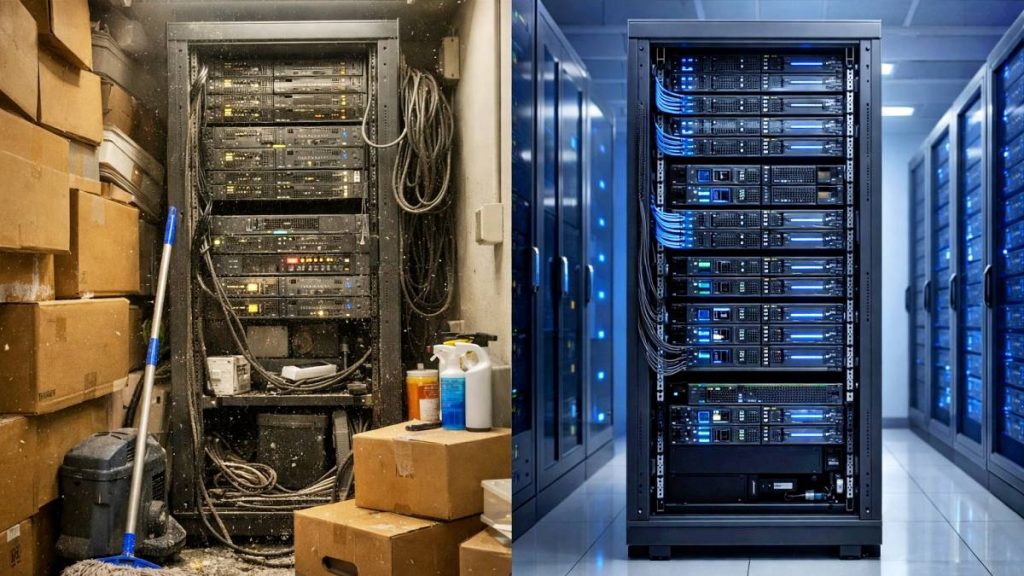Who’s Running Your Data Center?
When evaluating data center services for your business, one critical factor that often gets overlooked in favor of technical specifications is who owns and operates the facility. This distinction between privately held, owner-operated data centers and large corporate providers can significantly impact everything from service quality to flexibility and cost.

Unlike corporate data centers managed by distant executives and shareholders, privately held facilities like Datacate are operated by the same people who own them. This seemingly simple difference creates a cascade of benefits that directly affect your business operations, security posture, and long-term IT strategy.
Direct Accountability: When the Buck Truly Stops
In the corporate data center world, accountability is often diffused across layers of management. When issues arise, customers typically navigate complex support hierarchies, speaking with representatives who may have limited authority to address their concerns.
At privately held data centers, the ownership and management structures create a fundamentally different dynamic:
- Decision makers are accessible: When you need a non-standard solution or face an urgent issue, you’re rarely more than one call away from someone who can make executive decisions.
- No bureaucratic barriers: Without layers of corporate approval processes, solutions can be implemented rapidly.
- Personal investment: Owner/operators have their name and reputation directly tied to service quality, creating more substantial incentives for excellence.
This accountability isn’t just about faster issue resolution; it transforms the entire customer relationship from a transactional to a partnership-based one.
Flexibility: The Agility Advantage
The technology needs of businesses rarely fit neatly into standardized packages. Yet many corporate data centers operate with rigid service offerings and inflexible policies. The privately held alternative provides several key advantages:
Customization Without Compromise
Owner/operators can adapt their infrastructure and services to match specific business requirements without navigating corporate approval chains. This might include:
- Custom rack configurations tailored to your equipment needs
- Specialized cooling solutions for high-density deployments
- Flexible contract terms that align with your business cycles
- Unique connectivity arrangements with preferred carriers
The Uptime Institute’s 2024 Data Center and IT Spending Survey found that over 65% of businesses report having specialized infrastructure requirements that standard colocation offerings don’t adequately address. This gap is where privately held data centers thrive.
Rapid Evolution
When market conditions or technologies change, privately held data centers can pivot quickly. Whether implementing emerging security practices, accommodating new compliance requirements, or integrating innovative cooling technologies, owner/operators can make and execute decisions in days or weeks rather than quarters or years.
The Human Element: Relationships Over Transactions
Perhaps the most significant distinction between corporate and privately held data centers is the nature of customer relationships. In the corporate model, customers are often managed by account representatives who may change frequently and have limited technical knowledge.
In contrast, privately held facilities offer:
- Continuity of relationships: The same team members who help design your solution will likely support you for years.
- Technical depth at every touchpoint: Even non-technical staff at owner/operated facilities typically possess a deeper understanding of infrastructure than their corporate counterparts.
- True partnership approach: When your success directly impacts the data center’s reputation and referral business, your goals become aligned.
Security and Compliance: The Control Advantage
Data security and regulatory compliance requirements continue to grow more complex each year. Owner/operated data centers offer distinct advantages in navigating these challenges:
Enhanced Security Oversight
With smaller, more integrated teams, privately held data centers often maintain tighter control over physical and logical security systems:
- Physical access procedures can be more stringent when there is less turnover among security personnel
- Security implementations can be customized to specific client requirements
- Incident response can involve direct communication with leadership
Compliance Agility
As regulations evolve, privately held data centers can adapt more quickly:
- Faster implementation of new compliance measures
- More flexibility in documentation and certification processes
- Ability to customize compliance approaches for specific industry requirements
Many regulated industries, including healthcare and financial services, benefit significantly from this personalized approach to compliance management.
Cost Structures: Transparency and Efficiency
The financial models of privately held data centers often differ significantly from their corporate counterparts:
- Fewer hidden costs: With simpler organizational structures, privately held facilities typically have more transparent pricing.
- Value-based pricing: Rather than maximizing quarterly returns for shareholders, private operators can focus on sustainable, relationship-based pricing.
- Operational efficiency: Smaller organizations often operate with less overhead, passing those savings to customers.
According to research from 451 Research, the total cost of ownership when working with smaller, privately held data centers can be 15-20% lower over a five-year period compared to major corporate providers when accounting for all costs, including those related to inflexibility and service additions.
Real-World Impact: When Owner/Operator Management Makes a Difference
The benefits of working with privately held data centers translate into tangible business outcomes:
Case Example: Emergency Expansion
When businesses need to rapidly scale infrastructure due to unexpected growth or changes, the contrast between privately held and corporate data centers becomes clear. Corporate facilities typically operate near capacity with standardized expansion timelines measured in months.
Owner/operators like Datacate can often accommodate emergency expansions in days or weeks by:
- Reallocating space from planned expansions
- Working directly with clients to optimize configurations
- Implementing temporary solutions while developing permanent ones
Case Example: Custom Compliance Requirements
For businesses in regulated industries, standard compliance packages often fail to address all requirements. Owner/operated facilities can develop custom compliance documentation and controls precisely aligned with specific regulatory needs, rather than forcing clients to adapt to standardized approaches.
Evaluating Your Options: What to Look For
When considering a privately held data center, specific indicators help identify those that truly deliver on the owner/operator advantage:
- Leadership involvement: Do the owners actively participate in operations and customer service?
- Staff longevity: Low turnover often indicates a well-managed facility with strong institutional knowledge and expertise.
- Client relationships: Look for data centers with long-term client relationships spanning years or decades.
- Customization examples: Ask for specific examples of how they’ve customized solutions for other clients.
- Decision-making speed: Inquire about their process for non-standard requests and typical approval timeframes.
The Strategic Advantage: Beyond Infrastructure
Working with a privately held data center offers benefits that extend beyond basic infrastructure needs. The right partner becomes an extension of your IT strategy:
- Business continuity alignment: Owner/operators can integrate more deeply with your disaster recovery and business continuity planning.
- Growth planning: With more transparent relationships, you can share future IT plans and ensure alignment with data center capabilities.
- Technology guidance: Many privately held operators provide valuable consultation on infrastructure optimization.
Conclusion: The Owner/Operator Difference
In today’s rapidly evolving technology landscape, the privately held, owner/operator data center model offers distinct advantages for businesses seeking more than just rack space and power. The direct accountability, flexibility, relationship-based service, and customization capabilities create a foundation for IT infrastructure that truly supports business objectives rather than forcing businesses to adapt to standardized offerings.
For organizations valuing responsive service, adaptable solutions, and genuine partnerships over commodity pricing, privately held data centers like Datacate represent not just a different type of service provider but a fundamentally different approach to supporting mission-critical infrastructure.
When evaluating data center options, looking beyond technical specifications to understand ownership structure and management philosophy may reveal the most significant factor in long-term satisfaction and success.







